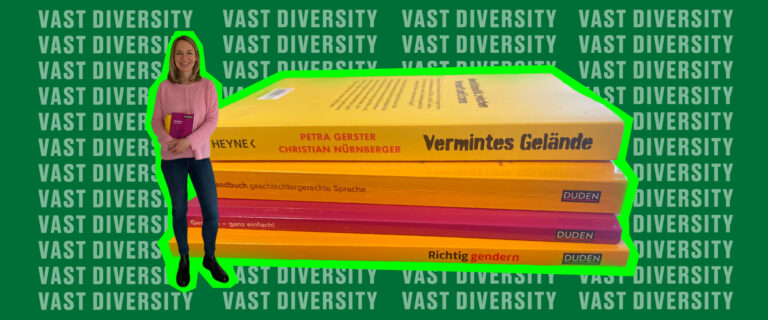

8. April 2022
Maria Trommer
The topic of gender inclusive language is a controversial topic that can turn a conversation into an argument. Many companies have so far completely ignored gender-appropriate or inclusive language in their corporate communications. For us, this is about attitude.
The birth hour for our concern with the topic of gender inclusive language occured in mid 2021, when we came across the topic during a meeting with Maren and Matthias in Dresden. Back then, we were already aware that our choice of words can have a significant influence on how we perceive the world. Consequently, we decided that I would work intensively on the topic in the coming months in order to put our corporate communications to the gender test.
I picked up a few reference books on the topic as well as searching the web, books and newspapers. I then collected all the learnings in our “gender guide” and shared it with the VAST FORWARD team. Since our customer communication is predominantly of digital nature and deals with concrete issues rather than people, there are only a few gender stumbling blocks in our daily business.
Nevertheless, over the last months we adapted internal forms, contracts, our websites, social media posts and email signatures to inclusive language.
Phrases implicitly co-referring to women no longer exist at VAST FORWARD. In our cost estimates, “man-days” became “person-days” and, of course, we also have a female CEO and not a male CEO. VAST FORWARD, as a diverse and female-led company, has made gender equity and inclusiveness an integral part of the corporate culture. With 7 female project managers in a technical and male-dominated industry, feminism is an important value for us.
In order to represent our colorful and diverse society in our language, the division into two genders is no longer adequate. According to an estimate by the German Society for Transidentity and Intersexuality e.V., between 60,000 and 100,000 trans people live in Germany today. Also in politics different realities of life are becoming increasingly visible: the LGTBTI+ community is now also represented in the European Parliament by the special envoy Riccardo Simonetti. And with Tessa Ganserer being the first member of the Bundestag to come out as trans.
To counter disadvantages of queer people in language, we at VAST FORWARD rely on the *gender star and will continue to monitor the developments regarding the subject.
What we’ve learned on our journey: Trial and error makes perfect. Just start!